
This resource is an article about abolitionists and the U.S. Constitution. Access to this resource requires a free educator login.
- Subject:
- History
- Social Science
- Material Type:
- Reading
- Provider:
- Teach Democracy
- Date Added:
- 05/10/2024

This resource is an article about abolitionists and the U.S. Constitution. Access to this resource requires a free educator login.
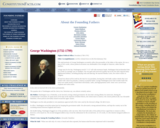
Read information about the "Founding Fathers" of the United States of America, including George Washington, James Madison, Thomas Jefferson, John Adams, Benjamin Franklin, Alexander Hamilton, George Mason, Gouverneur Morris, Roger Sherman, James Wilson, and Edmund Randolph.
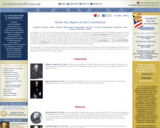
On September 17, 1787, the Constitutional Convention came to a close in the Assembly Room of Independence Hall in Philadelphia, Pennsylvania. There were seventy individuals chosen to attend the meetings with the initial purpose of amending the Articles of Confederation.
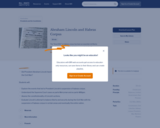
The "Great Writ" or habeas corpus has been an essential civil liberty guaranteed since Magna Carta. In listing powers denied to Congress, the Constitution notes that "The privilege of the writ of habeas corpus shall not be suspended, unless when in cases of rebellion or invasion the public safety may require it." In 1861, Abraham Lincoln invoked this power of Congress—which was not in session—to suspend habeas corpus in certain areas. The next year, as he believed the civil justice system was inadequate to deal with the rebellion, he expanded the suspension throughout the United States and established military tribunals to try citizens charged with disloyalty. In this lesson, students explore Lincolnâ"s suspension of habeas corpus and constitutional issues surrounding it.

Presidents Buchanan, Lincoln, and Johnson believed that the Constitution protected the institution of slavery. Lincoln came to the conclusion that, in order to preserve the Constitution and the Union it created, he must apply a new understanding of the principles on which the nation was built. The time had come to bring the nationâ"s policies in line with the of the Declaration of Independence that "…all men are created equal…" In this lesson, students will analyze Abraham Lincolnâ"s views on slavery and the Constitution as evidenced in the Emancipation Proclamation.

This lesson traces Lincoln's political life during a time of constitutional crisis. It examines Lincoln's ideas and decisions regarding slavery and the use of presidential power to preserve the Union.
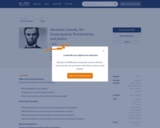
In this lesson, students will learn about Abraham Lincolnâ"s Emancipation Proclamation. Students will specifically learn about how Lincolnâ"s actions conform to the idea of justice and how they can apply this idea into actions in their own lives.

In Abrams v. United States (1919), the U.S. Supreme Court reinforced the “clear and present danger” test for restricting freedom of speech, previously established in Schenck v. United States, and upheld several convictions under the Sedition Act of 1918 (an amendment to the Espionage Act of 1917). Abrams is best known for its famous dissent, written by Justice Oliver Wendell Holmes, who had established the “clear and present danger” test just eight months prior.
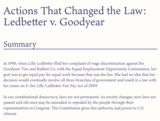
This lesson is based on the Annenberg Classroom video âA Call to Act: Ledbetter v. Goodyear Tire and Rubber Co.,â which tells the law-changing story behind the Lilly Ledbetter Fair Pay Act of 2009. Students gain insight into law-making process, consider how statutory decisions made by the Supreme Court can prompt better laws, and learn about the rights and responsibilities they will have when they enter the workforce.
The estimated time for this lesson is four days.
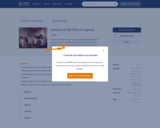
Students should have a solid foundation of the regional differences in the former colonies, now states, as well as an understanding of the ratification of the Constitution. This Lesson is best used after students have read The Constitutional Convention and The Ratification Debate on the Constitution Narratives in Chapter 3. The James Madison and the Bill of Rights Narrative in Chapter 4 can be used as background for the Lesson or can be assigned as homework after the Lesson to reinforce main ideas.
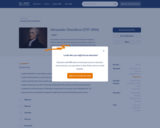
In this lesson, students will study the life of Alexander Hamilton. Students will learn about his reasoning in supporting a single and powerful executive leader, his role at the Constitutional Convention, and the role he played in shaping the new United States government.

This resource is a Google Arts & Culture interactive presentation about Alexander Hamilton and the ratification of the United States Constitution.

Trace the history of the Supreme Court’s group photograph through selected highlights, from the first in 1867 to the most recent in 2022.
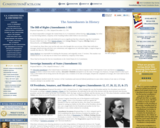
This webpage includes information about the amendments to the U.S. Constitution and their role in the history of the United States of America.
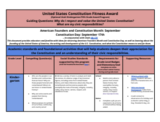
This is an optional program for use by Utah LEAs, schools, and teachers to observe Founders Month and Consitution Day. It aligns with and supports mastery of many Utah Core Social Studies Standards in grade K-5. Standards alignment is provided, along with resources for possible use.

The era of the American Founding lasted from the 1770s through either the late 1780s or early 1790s, depending on one’s perspective or school of thought. For the sake of this resource, the Founding is defined as being the period from 1776 through 1789 – that is, from the writing of the Declaration of Independence through George Washington’s inauguration as the country’s first president. This toolkit provides guiding questions and links to essential documents, resources, and lesson plans related to America's founding.

How have Americans shown civic virtues throughout history?
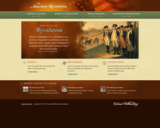
America's independence from Great Britain was a decisive turning point in world history. Join us to explore the causes, character, and consequences of an American Revolution that continues to shape lives around the globe. This site is a virtual museum experience. Explore the American Revolution by timeline, people, and multimedia.
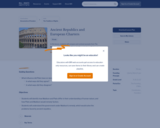
In this lesson, students will compare and contrast excerpts from The Republic of Plato and selected Federalist Papers by James Madison to determine in what ways Madison agreed and disagreed with Plato, regarding human nature the proper role of government in a society. What influence did Plato have on James Madison and the writers of the Constitution? In what ways did they agree? In what ways did they disagree?

A challenging, fun card game that helps students learn about their rights under the Bill of Rights, the first 10 amendments to the Constitution. The game offers three levels of play: Easy, Normal, Difficult.